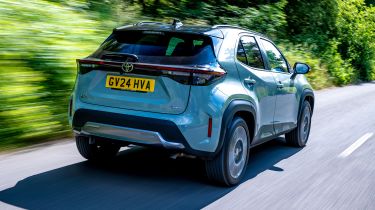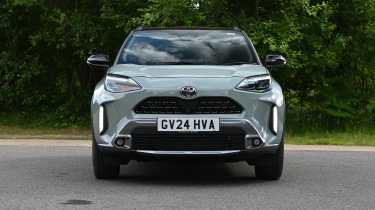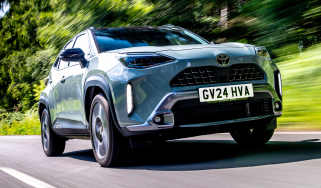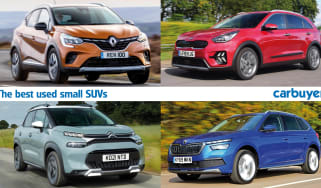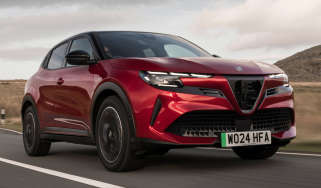Toyota Yaris Cross review - MPG, running costs & CO2
The hybrid setup does a good job of staying in electric mode when it can
Like the Toyota Yaris hatchback, the Yaris Cross is only available with a do-it-all hybrid powertrain. It’s an impressive set-up that should appeal to anyone who may have considered a diesel previously, and Toyota describes it as ‘self-charging’ because it doesn't require plugging in. The only real disadvantage is that while the hybrid is cheap to run, its complexity makes the Yaris Cross more expensive to buy than rival crossovers with a small petrol engine, with a starting price of around £25,000.
Toyota Yaris Cross MPG & CO2
Unlike some hybrids, the Yaris Cross has a powerful 79bhp electric motor and very effective regenerative braking to channel energy back into its battery each time the car slows down. This meant that during our test drive on a mixture of urban roads, country roads and dual carriageways, the Yaris Cross was able to drive using electric power an impressive amount of the time.
In fact, more than half of the journey was completed using only electric power, and the final fuel economy reading of 66.5mpg was better than Toyota's official figure of 62.8mpg for the front-wheel-drive Design version, with 102g/km of CO2 emissions. This puts it ahead of the 57.6mpg of the Hyundai Kona Hybrid, while mild-hybrid versions of the Ford Puma can return around 50mpg. Meanwhile, the Renault Captur E-Tense is a plug-in hybrid, so while its official figures are even more impressive, you’ll need to charge it on a regular basis to see real savings. Even the more powerful Hybrid 130 version is very frugal, managing 58.9mpg.
More reviews
In-depth reviews
There’s also a version with Toyota’s AWD-i all-wheel-drive system, but this reduces its efficiency to 55.4mpg and increases emissions to 115-116g/km of CO2. We’d avoid picking this version unless you live in an area with harsh winters where the extra traction is really necessary.
Low CO2 emissions make the Yaris Cross a good choice for private and company-car drivers alike, while its annual VED (road tax) is also at a discounted rate thanks to its hybrid powertrain. Residual values also appear impressive, with the Yaris Cross expected to retain just over 60% of its value after three years/36,000 miles, compared to around 56% for the Honda Jazz. This means the Toyota is likely to be worth more when it comes time to trade it in.
Insurance groups
The Yaris Cross has low insurance groups, so should be affordable to cover for most drivers. With the Icon version in group 11 out of 50, it’s below the group 15 insurance band of the Renault Captur E-Tech and petrol versions of the Ford Puma. Insurance groups also stay fairly level across the range, with the range-topping Premiere Edition only increasing it to group 14.
Warranty
Toyota launched a new ‘Relax’ warranty scheme in 2021, that can last for up to 10 years or 100,000 miles. It has the potential to outstrip any other manufacturer, with Kia’s warranty lasting up to seven years and rivals like Ford only offering a three-year warranty. The only catch is that the warranty is extended each year by visiting the Toyota main dealer for a service, so the warranty won’t be as long if you use an independent garage.
Servicing
Toyota offers competitive pricing for maintenance, and is currently offering a price-matching scheme against local independent garages. Expect to pay just under £30 per month for a servicing plan over three years. We also wouldn’t expect the Yaris Cross to require too much fettling, as Toyota’s hybrid powertrains have proven to be very reliable, with no clutch and reduced tyre and brake wear.
Which Is Best?
Cheapest
- Name1.5 Hybrid Icon 5dr CVT
- Gearbox typeAuto
- RRP£26,290
Most Economical
- Name1.5 Hybrid Design 5dr CVT
- Gearbox typeAuto
- RRP£27,890
Fastest
- Name1.5 Hybrid 130 Design 5dr CVT
- Gearbox typeAuto
- RRP£28,390

